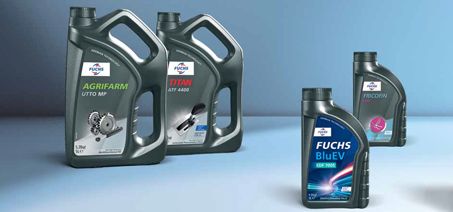Engine oil is a critical component in ensuring optimal engine performance and protection of internal parts. Its role extends far beyond simple lubrication: it facilitates proper heat dissipation, minimizes friction, and prevents premature wear. In this regard, FUCHS TITAN lubricants stand out for their advanced formulations and global recognition in high-performance and demanding automotive and motorsport applications.
However, even the highest-quality oils must be replaced at the correct intervals to maintain their properties and ensure engine efficiency. Below are the five key signs that indicate it’s time for an oil change, along with the most common symptoms of oil degradation.
Main functions of engine oil
To understand the symptoms of poor-quality oil and know how to detect it in time, it is first important to know what the functions of engine oil are:
Functions of motor oil
Lubrication functions for proper use:
Oil forms a protective film that prevents direct contact between metals, reducing friction. In other words, proper lubrication with the right motor oil is important for the smooth movement of parts.
Oil forms a protective film that prevents direct contact between metals, reducing friction. In other words, proper lubrication with the right motor oil is important for the smooth movement of parts.
Maintaining the right temperature is important to prevent engine failure. Oil helps dissipate the heat generated, acting as an additional cooling system.
Engine oil traps dirt particles, soot and combustion residues, preventing them from circulating through the engine. Poor oil performance would keep all this debris inside the vehicle's internal system, causing potential breakdowns.
Why is it crucial to change the oil on time?
Changing the engine oil at the recommended intervals is not simply a whim of the manufacturer, it is a vital necessity to keep the engine in optimal condition. Oil acts as a protective shield, but over time it degrades, loses viscosity and becomes loaded with contaminating particles.
When the maintenance schedule is not followed, the engine begins to suffer silently. It's like exercising without water: at first you can keep going, but little by little the wear and tear takes its toll.
Clear signs that your engine oil needs changing
1. Change in oil colour and texture
When you check the dipstick, if the oil is dark, thick and smells burnt, it means it has lost its properties.
What does dark, thick oil mean?
If you notice dark, thick oil, this indicates that it no longer lubricates properly and is loaded with impurities. It clearly needs to be changed.
What does the burnt smell mean?
If you notice a burnt smell, this is a warning sign of overheating and oil degradation. This is a case of oil in poor condition which, if not changed, could damage the vehicle's engine.
2. “Strange” noises in the engine
If you hear knocking or a metallic humming noise, the oil is probably no longer protecting the parts properly.
Knocking is a clear sign of a lack of lubrication, and the sound is the result of metal friction.
3. Excessive exhaust smoke
The type of smoke can tell you a lot:
- White: indicates coolant problems. Not all problems are related to engine oil.
- Blue: the engine is burning oil.
- Black: this colour is caused by an incorrect fuel mixture, but may be related to poor oil condition.
4. Oil warning light on the dashboard
When we see the oil can icon illuminated, it is a sign of low pressure or critical oil level. In any case, it indicates a potential problem that needs to be checked, whether due to lack of oil, loss of viscosity or even a leak.
5. Kilometraje o tiempo excedido Mileage or time exceeded
Even if you do not notice any symptoms, manufacturers recommend changing the oil every so often or after a certain number of kilometres. Learn about the differences in oil use depending on the type of vehicle to know your change interval.
Common symptoms of poor-quality oil
Engine oil lubricates, protects and keeps everything in balance. But when it loses its properties, your car starts sending you clear signals that something is wrong. Recognising these symptoms in time can prevent costly repairs and keep your engine running at 100%.
Below are the most common signs that your oil is no longer in optimal condition:
When oil deteriorates, it loses its ability to lubricate properly. This makes it harder for the internal parts of the engine to move, generating extra friction. The result is a less responsive engine that accelerates more slowly. This lack of power does not mean that the engine is broken, but rather that it is working harder and consuming more energy to compensate for the lack of lubrication.
Oil also acts as a temperature regulator. When it degrades, it stops dissipating heat properly, and the engine starts to run at higher than normal temperatures. If you notice that the temperature gauge rises easily, especially on hills, in traffic jams or on long journeys, this is a clear sign that the oil is no longer doing its job. If you ignore it, you could face serious damage such as burnt gaskets or piston deformation.
A poorly lubricated engine requires more effort to turn, and that extra effort translates into higher fuel consumption. If you've been visiting the petrol station more often lately without changing your driving style, the problem may not be how you drive, but rather deteriorated oil. Keeping it clean and at the right level allows the engine to run more smoothly and efficiently, saving you money with every kilometre you drive.
When oil loses viscosity or becomes too dirty, it no longer creates the proper protective film between moving parts. This causes the engine to run unevenly, generating vibrations that can be felt in the steering wheel, pedals, or even throughout the entire vehicle. Although these vibrations can be caused by other factors (such as tyres or suspension), poor oil condition is one of the most common and easily preventable causes.
Benefits of keeping FUCHS oil in good condition
Keeping oil in good condition leads to a number of benefits:
- Greater fuel efficiency: The engine works less hard, using less petrol.
- Less wear on internal parts: Prevents costly repairs in the future.
- Engine protection in extreme climates: In both cold and hot weather, quality oil maintains its performance.
Tips for extending the life of your engine oil
Avoid constant short journeys
Short journeys do not allow the oil to reach its ideal temperature, which causes residue to build up.
Always use the right oil
Do not mix brands or types of oil; follow the manufacturer's recommendations.
Carry out preventive maintenance
Regular checks prevent unpleasant surprises.
Engine oil, your silent ally
Quality products can always offer you better performance, but no oil lasts forever. It is important to pay attention to the signs and symptoms of poor oil condition that can save you from costly repairs. Remember: taking care of your oil is taking care of the heart of your car.
FAQs
Frequently asked questions about engine oil change:
Ideally, between 10,000 and 15,000 km or every 12 months.
For more specifications on the change interval depending on the type of vehicle, click on the following article: 7 mistakes when using motor oil that can damage your vehicle and how to avoid them.
If it is very thick, sticky, or does not flow well when checked, it has lost its properties.
Only in an emergency due to low oil levels. It is not recommended, as each manufacturer uses different additives that may react badly.
You increase the risk of premature wear, overheating and even serious engine damage.
Synthetic oil withstands extreme temperatures better, lasts longer and protects the engine better.
Need more advice?
By choosing FUCHS TITAN oils, you are not only protecting your engine, but also investing in proven quality, proven performance and long-term reliability.
If you would like further advice or information on how to choose the best lubricants for your vehicle, please contact our team of experts using the following enquiry form.
You can also get an overview of our wide range of automotive lubricants for passenger cars and commercial vehicles in our > Product Finder.
Would you like to search for yourself? With the FUCHS > Oil Selector, you will be guided step by step to the optimum lubricant for your vehicle.


